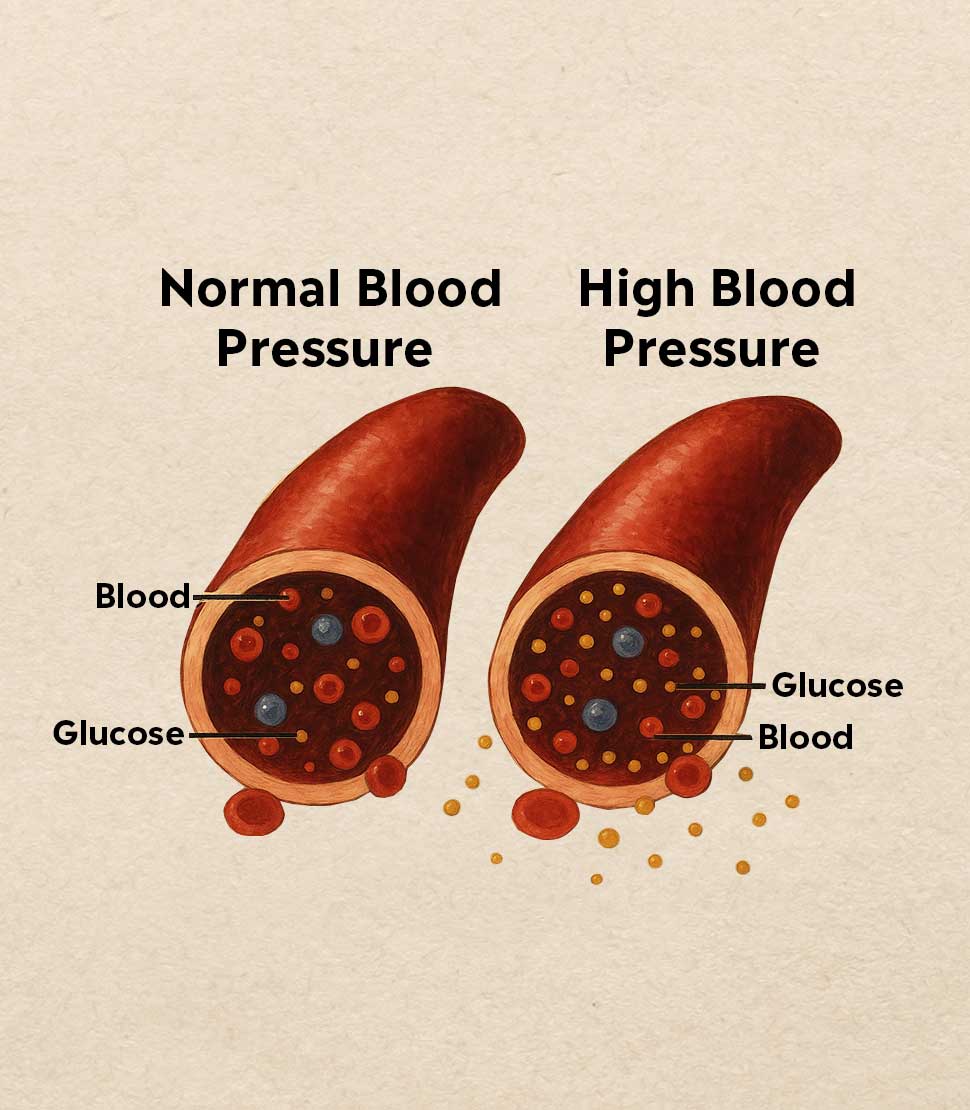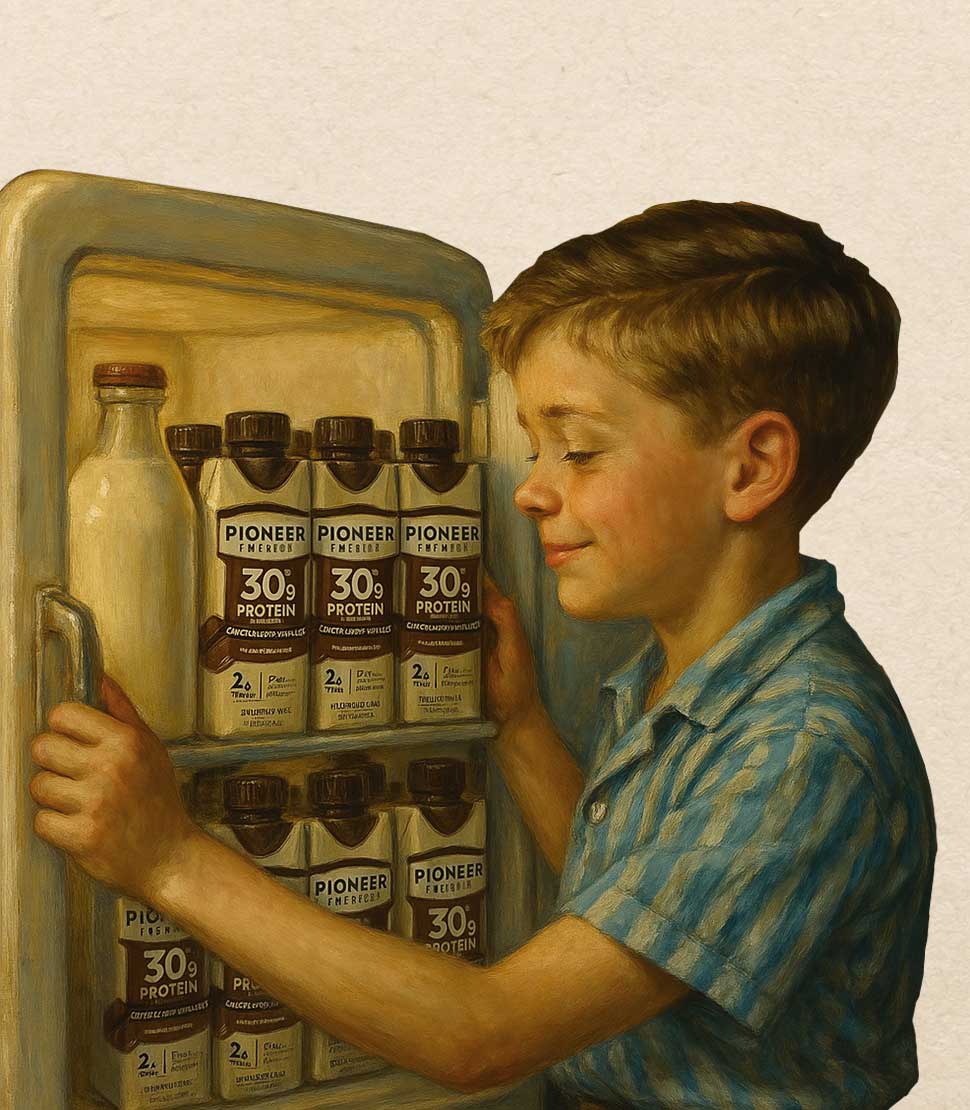

There's a myth that kids can handle sugar better than adults. Yes, it's a myth! I'm excited to debunk it today so you can help your kids be their best and healthiest selves.
Here's the problem. American children consume most of their calories from ultraprocessed foods jammed with added sugar. These sugary foods disrupt blood sugar and energy levels without filling young bodies up. Think it's a coincidence that 42% of US kids are overweight, obese, or severely obese? It's the modern high-sugar diet plus not enough exercise.
We parents must be the adults in the room. Our kids want sugar — it's yummy, habit-forming, and hard to avoid — so we need to create the proper environment so they can grow up healthy adults. We're on a mission here!
You can't control your child's diet 100% — nor should you try to — but you can guide them mindfully. I cook healthy meals with my little boys (with protein, fat, and fiber), help them connect with how food makes them feel, and keep processed junk out of the house. You don't need to be the perfect mom or dad who never has ice cream or a margarita. Believe me, I'm not that mom! You just need to be good.
Good can be very good, though. If you apply my advice today, you'll be in the top 1% of parents. You'll be helping your children understand the nourishing value of food and carry it with them for life. They'll be happier and healthier for it.
Before we get to the tips, though, let's talk about what sugar is doing to our kids.

Our Kids Eat Too Much Sugar
The CDC recommends people 2 years and older limit added sugar to under 10% of their daily calories to reduce the risks of health problems like obesity, type 2 diabetes, and heart disease. That's 200 sugar calories on a 2000-calorie diet — about one 16-ounce bottle of cola or 12 teaspoons of table sugar.
Added sugar refers to table sugar, high-fructose corn syrup, honey, and other simple carbohydrates added to food or beverages during processing. It doesn't include sugar from natural sources, like fruit. Sugar from an apple is generally healthier because it's attached to fiber, reducing the blood sugar spike. But drinking apple juice without the fiber is the same as munching on sugar cubes.
How much added sugar are Americans consuming? Both adults and children consume 17 teaspoons of added sugar daily — 5 teaspoons over the limit. So, pound-for-pound, children consume significantly more sugar than adults. These figures need to come down so our kids can be healthier.
How do we improve them? I'm not a believer in counting calories, or teaspoons of sugar for that matter. Counting calories defines zero-tolerance diets that make us feel confined, food-obsessed, and guilty when we don't hit the mark. Instead, we want our kids to deeply understand how food nourishes their bodies. When we eat whole foods with protein, fat, and fiber, our body thanks us by making us look and feel better.
I'll share how I teach my kids about food shortly. First, let's talk about why excess sugar is harmful to young brains and bodies.

Why Sugar Is Harmful
Why are high-sugar diets harmful to adults and kids? Mainly because eating too much sugar
leads to:
- Blood sugar issues
- Inflammation
Blood sugar management is an underappreciated pillar of health. Sugar (as glucose) is a primary energy source in our bodies, and it governs hunger, energy levels, and weight management.
The foods we eat influence our blood sugar levels. Specifically, sugary foods and drinks spike blood sugar, and what goes up must come down. When blood sugar crashes, your kid gets hangry, acts up, and sneaks more snacks. High blood sugar also makes the pancreas release insulin, a hormone that promotes fat retention. Childhood obesity, here we come.
The key to managing blood sugar is balance. Balance means reducing simple carbohydrates (juice, cereal, candy) that cause blood sugar spikes and subsequent crashes, and pairing simple carbs with more satiating foods that curb blood sugar spikes. I curated my Fab 4 — protein, fat, fiber, and greens — to help people balance their blood sugar. These nutrients help kids just as much as they help adults!
Too much sugar may also contribute to inflammation, a low-level immune response that damages healthy tissues. Let me share two studies. Scientists linked a high-sugar diet with higher levels of inflammation (measured by a protein called CRP) in 244 healthy women. Other researchers found that children who drink more sugary beverages show higher levels of inflammation.
Those are the science-backed whys of why sugar is bad. Let's get more specific about why we should watch our children around sugar.

What Sugar Is Doing To Our Kids
I have three young boys. I want them to develop into healthy adolescents and adults. Most parents want the same for their children but don't realize how bad sugar really is.
I'll briefly cover some science to drive the point home. I spent eight years in medicine, so I'm no stranger to peer-reviewed research!
Obesity
Multiple studies link sugar intake to childhood obesity. Obese children, unfortunately, are more likely to be obese adults with higher risks for many health problems.
In a Greek study, children consuming over 10% of their calories from added sugar were about two times more likely to be obese than children under that limit. In Australia, children consuming fruit juice or soft drinks twice or more daily were 1.7x more likely to be overweight or obese than children who consumed less than one sugary drink weekly. Don't believe it when you hear fruit juice is healthy!
Why does excess sugar cause weight gain? For one, sugar calories are less satiating than calories from fat or protein, so your child ends up eating more food overall.
Also, we're wired to crave sugar. Sugar is a pleasurable reward that helped our ancestors put on fat for harsh winters. But the excess sugar in the modern diet makes us store too much fat that we no longer need.
Tooth decay
Sugar feeds oral bacteria like Streptococcus mutans, which cause tooth decay. As you may have heard, the research shows children who eat more sugar get more cavities. The takeaway is that reducing sugar in your child's diet will likely reduce trips to the dentist. That will make everyone smile.
Gut problems
Eating too much sugar appears to negatively impact gut health.
In adults, shifting from a low-sugar (high-fiber) diet to a high-sugar diet triggered symptoms like diarrhea, abdominal pain, and bloating. The dietary shift led to a lower diversity of gut bacterial species and a higher rate of food leaking through the intestines, both negatives for gut health.
Having more data on kids would be nice, but we don't need it to act. I encourage my boys to eat plenty of fiber and greens to foster healthy gut bacteria and digestion. Check out my podcast with Dr. Steven Gundry for a deeper dive into gut health, including the role of diet.
Mood
Any parent knows how their kid gets during a sugar crash. Grumpy. Sleepy. Hungry. Angry. Hangry. Oh so hangry!
In a 2022 study, children consuming more than one sugary beverage per day were more likely to show depressive symptoms than children not consuming these drinks daily.
What might explain this finding? Well, when blood sugar spikes and crashes, energy and mood spike and crash along with it. Animal evidence also suggests eating sugar decreases brain-derived neurotrophic factor, a brain chemical important for mood regulation.
My boys are less emotionally stable when they eat too many simple carbs. I'm helping them notice these mood swings in my role as mommy.
ADHD
I also worry about sugar and learning disorders. Several studies link higher sugar intake to ADHD in children[*][*][*]. Other research, however, suggests eating more sugar may be a consequence of ADHD — not the other way around.
If sugar does contribute to ADHD, dopamine is likely involved. When kids eat sugar, it causes their brains to release too much of this rewarding chemical. Eventually, this chemical flood makes their brains less sensitive to dopamine, a hallmark of ADHD.
Bottom line? Whether eating sugar causes ADHD or ADHD gives kids a sweet tooth, there's no downside to cutting back on the sugary stuff.

How To Manage Your Kid’s Sugar Intake
As adults, we're responsible for the diets of our kids. We can't control everything, but we can foster a healthy, supportive environment that helps them grow up strong. Here are five tips to do that:
- Use protein, fat, and fiber. Protein, fat, and fiber reduce blood sugar spikes even when simple carbs are present. Structure your child's meals around these nutrients to stabilize and satisfy them. Read how my Fab 4 supports metabolic health here.
- Control the home front. You can't stop kids from munching gummies at a friend's, but you can control your kitchen. Make your pantry and fridge low-sugar safe havens. Inspect food labels for words that end with "ose" (like dextrose), and don't be fooled by natural sugars like honey, agave, or maple syrup. Sugar is sugar. Quick example: instead of buying chocolate milk, I stock my fridge with low-sugar chocolate milkshakes and chocolate milk from Pioneer Pastures. As a bonus, the type of protein produced by Pioneer Pastures’ cows (A2 protein) is easier on the digestive systems of many folks than regular milk protein.
- Set a good example. You don't need to be perfect (I'm certainly not!), but do your best not to buy or consume sugary treats in front of your kids. Also, skip the kid's foods. Encourage your kids to eat what you eat — smaller portions of whole-food meals. That's how they'll form lifelong healthy eating habits.
- How does this food make you feel? I want my boys to recognize how food affects their energy and mood. When they're sobbing during a sugar crash, that's a teachable moment. I remind them they might feel better with a protein snack or drink of water. These moments are sinking in.
- Cook with your child. You don't have to bake cookies to have a lovely bonding experience with your family. I'm always cooking something healthy with my little rascals, from veggie dips to omelets. Yes, it takes longer. And yes, the fun and lessons it imparts are worth it.
In other words, teach your kids to take charge of their health. Control what you can, educate mindfully, and do your best to set a good example.
As time passes, these habits will become your family routine. Whole foods will be the default. Sweets will be an occasional treat. You'll be a low-sugar family, and your kids will thank you for it later.




